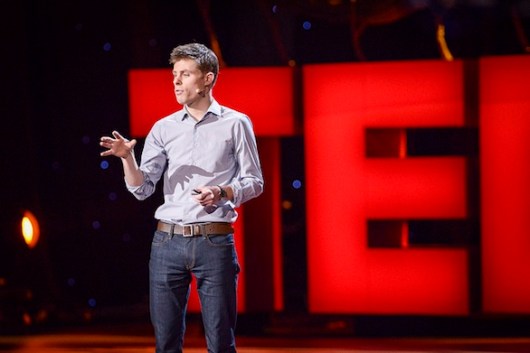One of the things we’re interested in exploring here at TED is … what happens after a talk? Most often, a speaker is telling us a story without an ending — a tale that’s just beginning rather than coming to an end. That’s certainly the case with TED2013 speaker Alastair Parvin, whose project, Wikihouse, is really just getting started. Parvin has created an open-source construction set for a house, and I caught up with him in a break at the conference to get more details about some of the projects that are underway to build on it.
One application for this cookie-cutter build-your-own-house system is disaster relief. At least, if done responsibly. “Actually, the last thing you want to do after a disaster is build,” Parvin points out. But those caught up in the aftermath of an event such as an earthquake can find themselves stuck in grim emergency housing for long periods of time. Parvin describes a Wikihouse-enabled project in Christchurch, New Zealand, an area that experienced a huge earthquake in February 2011, and where citizens are still trying to rebuild.
Might Wikihouse help empower them? Parvin hopes so. “They’re looking at coming up with a construction model for sustainable housing rebuilding, led by communities there,” he explains. It’s that last phrase that’s crucial. “It’s an interesting flip from disaster relief housing to community-led development.”
Then there’s Wikihouse/Rio, which is using the system in a rather different way — as an “open-source maker lab in the heart of the favela.”
“There, they said not to worry about making a structure,” Parvin says. “Kids and teenagers can start experimenting, maybe creating furniture. Maybe that will lead to building, but it’s not about us defining what happens from the outset. It’s about being open. We’re giving people amazing tools and saying this could be a serious form of community development, but it’s led by them. If they get to the point where they want to build, that’s great.”
This diversity of applications is central to the promise and potential of Wikihouse. “It’s great to do a TED Talk,” says Parvin, for whom Wikihouse is a passion project he works on alongside the others he undertakes as part of the Zero Zero architecture collective in London. “But this is an open-source project. It’s not about me standing up on stage and showing everyone what we’ve done. It’s more about issuing an invitation to others. Frankly the less control we have, the happier we get.”

Comments (5)
Pingback: TED 2013: 9 Take-Home Themes for Me
Pingback: My 13 favourite talks from TED 2013 | Sue Gardner's Blog
Pingback: Wizmo Blog » Blog Archive » Wikihouse’s Alastair Parvin on the bright potential of community-led development